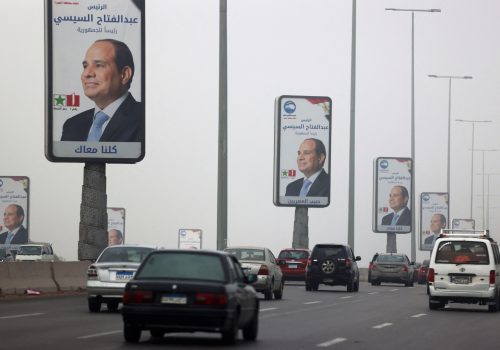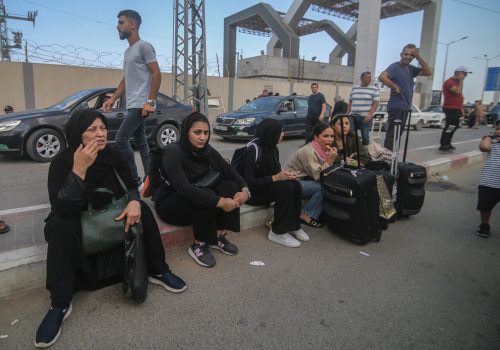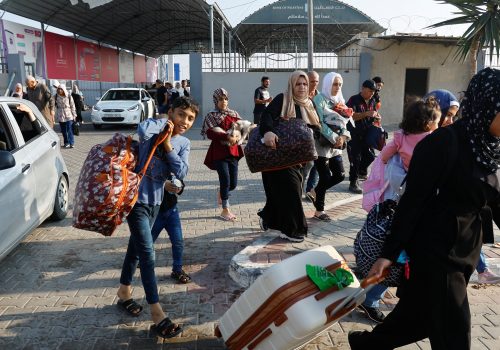As long as Sisi continues his policies, the Egyptian economy will drown
On March 17, the European Union (EU) announced an $8.1-billion (7.4-billion euro) aid package for Egypt to curb illegal migration to the European continent. This is the latest in a series of assistance deals meant to shore up the country’s ailing economy.
The EU-Egypt deal comes on the heels of an expanded $8 billion loan agreement sealed with the International Monetary Fund (IMF) on March 6 to encourage Cairo to continue the deep structural reforms it started in 2016, which were conditioned by the IMF loan program. This includes shifting to a flexible exchange rate, reducing the state’s footprint in the economy, and leveling the playing field between the public and private sectors. The deal also comes just weeks after Egypt struck an agreement with the Emirati sovereign wealth fund,Abu Dhabi Developmental Holding Company (ADQ), for $35 billion in investments to develop part of Egypt’s Mediterranean coast.
Aid packages offer lifeline to faltering economy
The recent financing—totaling a staggering $51.1 billion—offers Egypt’s faltering economy a lifeline at a time when the country faces a severe foreign currency shortage, unprecedentedly high debt levels (public debt currently exceeds 92 percent of gross domestic product (GDP)), and soaring inflation. The influx of cash is intended to address the foreign currency crunch and reinforce stability in the country. The bailouts are also meant to help Egypt address the fallout from the conflict in the neighboring Gaza Strip that has been raging since October 8, 2023. Among the repercussions of the ongoing war on Egypt’s northeastern border is a 40 percent drop in Suez Canal revenues so far this year due to Houthi rebel attacks on commercial and military ships using the vital waterway.
SIGN UP FOR THIS WEEK IN THE MIDEAST NEWSLETTER
But while the funding secured in recent weeks will help ease the economic crisis and stabilize Egypt in the short term, skeptics fear it may only offer a temporary respite. Timothy Kaldas, deputy director of the Tahrir Institute for Middle East Policy, argues that the 2016 IMF loan program failed to achieve its objectives because the IMF did not adopt stricter conditionality. Others warn that the financial support may be wasted on a failing economy if President Abdel Fattah el-Sisi continues to pursue the same economic policies that have led the country to where it is today.
“The EU package will provide Egypt with some welcome relief from its current economic distress,” James Moran, an associate senior research fellow at the Center for European Studies (CEPS), and former head of the EU delegation to Egypt, told me.
“Global crises such as the coronavirus pandemic, the Ukraine war, and the war on Gaza are partly to blame for Egypt’s current economic troubles,” he noted, adding that “misguided economic policies in recent years have also played their part.”
Policies such as Egypt’s expensive subsidy regime, a bloated and degenerating civil service, and what some analysts describe as Sisi’s ”vanity” mega-projects—including a new administrative capital in the desert at an estimated cost of $59 billion—have pushed the economy to the brink of collapse.
While over the last decade, Egypt has significantly reduced its energy subsidies, which had previously accounted for around 6 percent of the country’s GDP—the latest fuel price hikes were announced on March 22, in line with IMF conditions—food subsidies still account for 2 percent of GDP. This is partly due to wheat imports from Russia, Ukraine, and, more recently, Australia and Eastern European countries like Lithuania, Bulgaria, and Romania. By the end of last year, wheat subsidies cost the government $119.8 billion (95 billion Egyptian pounds)—more than double the previous year’s cost. Meanwhile, the country’s civil service employs approximately 5.6 million Egyptians—one civil servant for approximately every eighteen citizens—across dozens of state-owned companies headed by army generals or military loyalists.
As Moran said, “If the EU funding is to have a real impact, it will be important that the IMF agreement, with which much of the EU package is linked, is honored.”
Fundamental changes are needed for the economy to recover from the current downturn. For one, the state—specifically the army—must diminish its extensive economic role. The army’s vast empire includes practically anything and everything; from hotels and gas stations to housing and infrastructure projects, and from mineral water and food to consumer goods. With multiple privileges that include exemption from taxes and customs duties, the army has crowded out civilian competitors. Also, several “rival” businessmen have reportedly been arrested and jailed for refusing to hand over their assets.
There has been little to indicate that the military is willing to loosen its stranglehold over the economy thus far, despite the government’s promises to withdraw from “non-strategic sectors.” This is understandable as dismantling its diverse business interests would mean an erosion of the army’s political influence as well as the loss of substantial revenue for the armed forces. But reducing the state’s footprint would allow for an enabling and more inclusive business environment, paving the way for faster growth, lower prices, job creation, and more opportunities for ordinary Egyptians.
Secondly, shifting to a flexible exchange rate would help the economy better adjust to external shocks. Scaling back state intervention in the economy would attract greater investments and support exports by allowing Egyptian businesses to sell their goods and services in international markets.
After years of stalling the necessary monetary and fiscal reforms based on the false premise that a stable currency reflects a stable economy, the Central Bank of Egypt finally announced a “flotation” of the Egyptian pound on February 1, but only after hiking interest rates by six hundred basis points. Analysts remain skeptical, believing the move is yet another devaluation of the currency to curb soaring inflation. Whether the latest devaluation will evolve into the flexible exchange rate regime conditioned by the IMF remains to be seen. If not, it will be virtually impossible to keep the lid on inflation—which is currently around 36 percent.
The success of the IMF loan program will also largely depend on the government’s ability to stem inflation’s erosion of the purchasing power of low-income and middle-class families and protect society’s poorest and most vulnerable. Failure to do so would increase the risk of social unrest. Social protection programs are crucial to ease the suffering of the poor, who feel the pinch of soaring food prices and rampant inflation. The government has taken steps to quell rising discontent, expanding coverage of cash transfer programs to cover more than five million households and increasing the minimum wage for public-sector employees—part of a $3.8 billion social protection package.
However, ensuring adequate social protection for the poor is only one part of the equation: the government also needs to improve the efficiency and effectiveness of public spending to help maintain the fiscal discipline demanded by the IMF. It needs to prioritize growth-stimulating capital expenditures and focus on reducing the country’s staggering debt. Continuing to spend badly-needed funds on wasteful mega-projects that may take years to yield economic returns—if at all—is a recipe for disaster and can only exacerbate the current crisis.
Egyptian government must ease ‘systematic repression‘
But that’s not all. Marked progress must also be made in improving Egypt’s poor human rights record to guarantee continued support from donors and development partners.
“The European parliament will probably want to see an improvement in the country’s approach to rights issues before agreeing to the release of a large part of the funding,” Moran said, noting that “there’s a lot of work to do on both sides for the aid package to be fully effected.”
Shortly after news of the EU aid package was announced, Kenneth Roth, former Human Rights Watch executive director, lamented in a post published on his X (formerly Twitter) account that the EU is “going to funnel billions to Egypt’s President Sisi—ignoring that Sisi has imposed the most brutal dictatorship in modern Egyptian history—because he will help stop irregular migration to Europe.” Rights advocates fear that the Egyptian authorities’ systematic repression will continue if the funding is not directly linked with progress being made on human rights.
Meanwhile, in a move that signals the government is taking concrete steps to shed its old image, an Egyptian appeals court abruptly ordered the closure of a long-running investigation into five remaining nongovernmental organizations (NGOs) in the 2011 Case 173, known to Egyptians as the “NGO foreign funding case.” The move came shortly after the announcement of the aid package, which led some observers to speculate that the closure of the probe was linked to the aid. Investigations in the case have continued for some thirteen years—ever since security forces raided the offices of several NGOs in 2011, arresting dozens of civil society workers and prosecuting them on charges of receiving illicit foreign funding and/or operating without a license.
In 2013, forty-three of the accused—including sixteen Americans—were sentenced to between one and five years in prison. The Court of Cassation ordered a retrial in 2018, which resulted in all defendants being acquitted. The justice ministry released a statement in August 2023 announcing that it would drop charges against seventy-five civil society organizations—the bulk of them charity organizations and others working in development. Travel bans and asset freezes imposed on the NGOs were also lifted, but the same punitive measures remained in place for twenty prominent human rights defenders standing trial in the case.
While the closure of the case is a significant step in the right direction, ending arbitrary detentions and widespread and systematic enforced disappearances, and releasing the thousands of political prisoners detained for their ideological and political views would be another milestone and further proof that the Sisi regime is seriously implementing its promised democratic reforms. The authorities would also do well to stop curtailing freedom of speech and assembly. Such moves are crucial to show that Egypt is worthy of the bailouts it has received and would go a long way in ensuring additional support in the event of any future unforeseen crises.
The Sisi government knows only too well that the EU and the IMF will continue to support Egypt because of its strategic location and its pivotal role in curbing migration. However, it would be a grave mistake for the Egyptian leadership to think it can get away with delaying the promised reforms, or that the aid will be forthcoming regardless of whether it continues its failed economic policies. The outcome of continued economic mismanagement, flawed priorities, and repetition of past mistakes can only deepen the current crisis—and perhaps even lead to economic collapse.
Shahira Amin is a nonresident senior fellow at the Atlantic Council’s Scowcroft Middle East Security Initiative and an independent journalist based in Cairo. A former contributor to CNN’s Inside Africa, Amin has been covering the development in post-revolution Egypt for several outlets, including Index on Censorship and Al-Monitor. Follow her on X: @sherryamin13.
Further reading
Thu, Dec 7, 2023
President Sisi’s third term will be his biggest challenge—not the upcoming Egyptian election
MENASource By Shahira Amin
While it is certain that Abdel Fattah el-Sisi will win a third term, it is uncertain what will happen after the vote and when the Gaza war is over.
Sat, Oct 14, 2023
Egypt cornered over Israel’s war on Hamas
MENASource By Shahira Amin
Whether Egyptian President Abdel Fattah el-Sisi will bow under US and Israeli pressure remains to be seen.
Fri, Nov 3, 2023
As the Gaza war continues, Egypt is facing pressure to act
MENASource By Shahira Amin
As Israel expands its ground raids in the Gaza Strip, Egypt is witnessing the ripple effects of the war and faces growing pressure to act in regard to Palestinian refugees.
Image: People turn to Banque Misr and the National Bank to buy three-year savings certificates, with a return of up to 22% and the return is paid monthly, or 19% interest is also paid monthly, and this came in conjunction with raising the interest rate by 200 points, as citizens began searching on Google engines about Ways to buy a National Bank certificate with a return of 22 and 19% per month, to invest their money in it. The National Banking Bank said during its statement today that the issuance of two savings certificates for a period of 3 years reflects the positive vision of lower interest rates during the coming period with the expected gradual decline in inflation rates with the stability of markets in Shadow of International and Domestic Variables and the Central Bank of Egypt's Inflation Targeting Policy April 3, 2023 in Cairo, Egypt. (Photo by Mahmoud Elkhwas/NurPhoto)


